#science advice
Text
To whom it may concern,
Just a suggestion, or gentle recommendation, but if you're writing code for a scientific study of any kind, maybe consider, possibly, limiting the number of swear words in said code because now many journals now require you to have your code publicly available in order to publish and if that's the case, then you'll have to spend many hours editing out all the swear words you put into your code or risk getting rejected by the journal that you already payed way too much money to in order to submit your paper.
Sincerely,
The scientist currently cursing her past code-writing self.
2K notes
·
View notes
Text
Dear people who aren't physically disabled who plan to write fantasy settings:

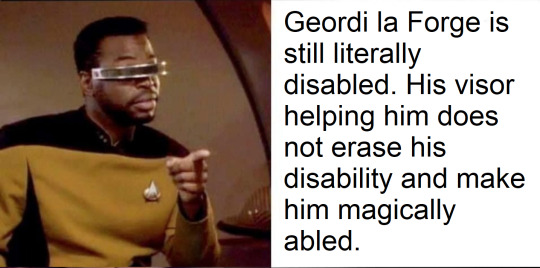
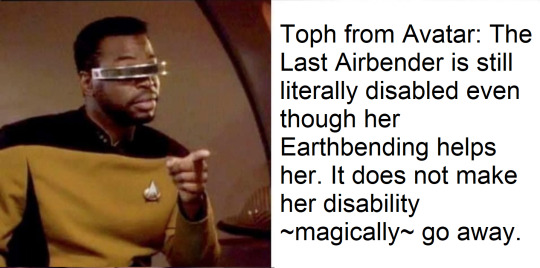


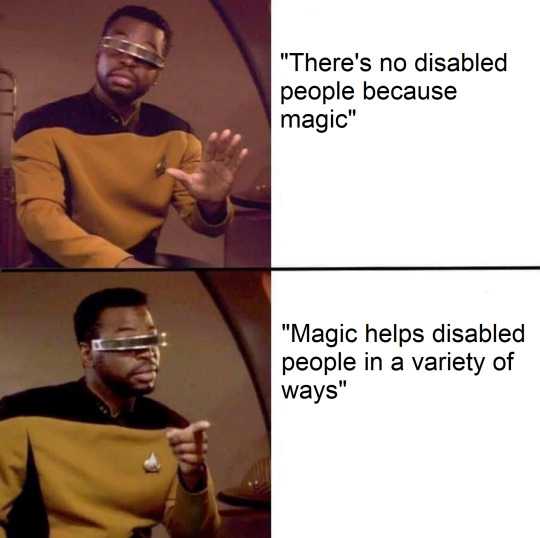
[ID: Several images taken from the Geordi La Forge yes and no meme format, with Geordi holding out a hand disapprovingly for the no section, then pointing in approval for the yes section.
The first image is the meme:
No: "Saying the existance of magic in your setting means there are no disabled people (this literally just means disabled people are killed. AKA eugenics)"
Yes: "Having disabled people who use magical mobility aids and other assistive devices. Realizing that someone is still disabled even if their prosthetic arm is made of magic instead of plastic."
This is followed by four more panels of yes section:
"Geordi la Forge is still literally disabled. His visor helping him does not erase his disability and make him magically abled."
"Toph from Avatar: The Last Airbender is still literally disabled even though her Earthbending helps her. It does not make her disability ~magically~ go away."
"Having your disability be accomodated does not mean the disability goes away. Having a prosthetic hand, even one that's made of magic, does not mean you're not disabled."
"Magical mobility aids do not mean disabled people don't exist. It just means they use magical mobility aids instead of plastic or metal ones. A limb made of magic is still a prosthetic even if it's made of the soul of the universe instead of plastic and metal."
Then another no panel: "'There's no disabled people beacuse magic'".
Then one last yes panel: "'Magic helps disabled people in a variety of ways'".
End ID.]
This also applies to science fiction; just because Luke Skywalker's prosthetic hand is super advanced doesn't mean it's no longer a prosthetic, or that he's not disabled. Same with Darth Vader - just because he has a suit that lets him breathe and walk around doesn't mean he's not disabled. (And Star Wars' propensity for making the villains visibly disabled while the heroes disabilities get covered up by super advanced prosthetics is a topic that deserves its own post, especially with how ableist some of the authors of the books are. Troy Denning is especially ableist)
Edit:
Because people keep being fucking obnoxious and ableist in the tags, yes,,, motherfuckers, if you refuse to have disabled people in your setting, that does make you fucking ableist. If you say that the magic is used to cure all disabled people and that's why they don't exist, that's fucking eugenics.
You cannot ""cure"", more like remove all disabilities without fucking eugenics. Magically automatically destroying disabled fetuses (a very fucking popular trope!) is eugenics.
The only way to fucking "cure" autism is to fucking kill all autistic people, also known as eugenics!
What about people with PTSD? Do you just fucking brainwash them so they aren't traumatized anymore?
Do you force all Deaf people to be able to hear? Do you force all blind people to be able to see? Do you force all anosmics to be able to smell?
Do you magically force everyone with a speech impediment to speak to your standards?
Do you force everyone born with bodily or facial differences to live up to your fucking standard of beauty?
You cannot fucking say "disablities don't exist in this universe because magic cures everything" without inherently saying that eugenics exists in your fucking universe.
Not all fucking disabilities need a cure. If you ""cured"" my autism I'd just be fucking dead. You'd literally just be changing me into what you think is fucking acceptable.
Stop fucking arguing in defence of ableists on my fucking post so you can pretend that eugenics has never been written about in magical settings when it is extremely fucking prevalent.
And while we're fucking at it, let your gods damned characters become disabled over the course of their story, and call them disabled within the fucking story. I don't care if they're a robot. I don't care if they have magic. Not all fucking damage can be fixed. Curses exist. Hardware can go out of fucking date and no longer be manufactured anywhere.
Let your characters become disabled and do not magically fucking cure them back to brand new every single time they get hurt. The only thing you accomplish by doing that is destroying any chance of ever having stakes.
No, "magical healing leaves scars on the mind from the memory of the injuries though!!!!" is not fucking good enough. Let your characters have scars. Let them become disabled. Stop being fucking ableist cowards.
Edit number fucking 2:
No, motherfuckers, you do not get to comment "if the disability was caused by magic it's not ableist to cure it with magic". You are the ableist this post is about. Shut the absolute fuck up, stop treating being disabled as the worst possible outcome, and just admit you're a fucking ableist. If you don't want your characters to become disabled, then don't fucking make them disabled.

[ID: The Garfield "you are not immune to propaganda" meme, now edited to read:
"If your first thought upon reading this post is, 'Oh, but it's okay to magically cure disabilities caused by magic!' Congrats…you are the exact sort of ableist jackass this post is about."
End ID.]
Edit number fucking 3:
Autistic people exist! People who are born with disabilities exist! You cannot create a setting where disabled people do not exist because we're all "cured" or "fixed" and not inherently say that you are killing disabled people as soon as they're born, or fucking aborting us as soon as you figure out we'd be born disabled! That's fucking eugenics!
There is no way to "cure" autism without eugenics! There is no way to "cure" people with body differences without eugenics! There is no way to make disabled people nonexistant in your setting without eugenics! Thinking you can and should "cure" and "fix" all disabilities IS EUGENICS!
Also:
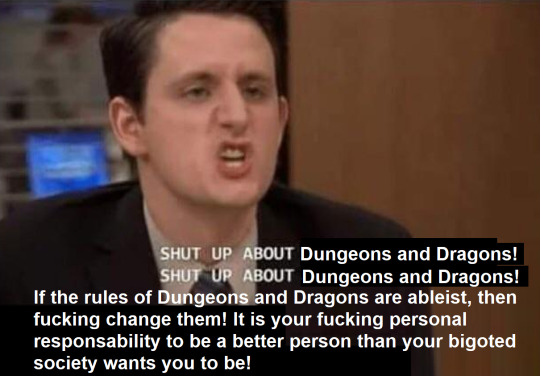
[ID: A character shouting at the camera, now edited to read:
"Shut up about Dungeons and Dragons! Shut up about Dungeons and Dragons! If the rules of Dungeons and Dragons are ableist, then fucking change them! It is your fucking personal responsability to be a better person than your bigoted society wants you to be!".
End ID.]
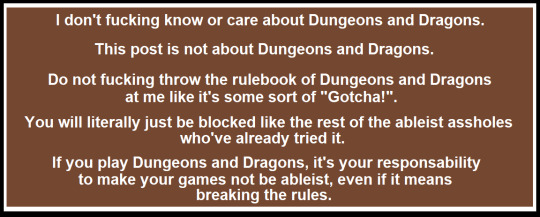
[ID: White text on a dark brown background with white and black borders around the edges, that reads:
"I don't fucking know or care about Dungeons and Dragons.
This post is not about Dungeons and Dragons.
Do not fucking throw the rulebook of Dungeons and Dragons at me like it's some sort of 'Gotcha!'.
You will literally just be blocked like the rest of the ableist assholes who've already tried it.
If you play dungeons and dragons, it's your responsability to make your games not be ableist, even if it means breaking the rules.".
End ID.]
I do not fucking care what the ableist rules are in Dungeons of Dragons. Do not fucking throw ableist rules for a game I have never and will never play at me on a post I made so that people could learn how to make their settings less ableist. If the rules in Dungeons and Dragons are ableist, then fucking change them. If you don't want to change them, then stop fucking playing an ableist game.
Disabled people deserve to see ourselves represented in fiction just like everyone else, without any fucking requirements that we be "cured" or "fixed" before the story ends.
How the fuck would you feel if a trans and gay character's whole story revolved around going on a quest to become straight and cis, did so, and only then was allowed to live happily ever after?
Why do you fucking think suggesting people write stories about disabled people going on a quest to be cured because it's the only way they'll ever be happy is any less fucking offensive?
Also:
This post is NOT a place for you to talk about how disabled people in fiction should have the option of curing their disabilities. It's just not. That's the fucking default for this society. That is not a revolutionary concept. It's not novel. We fucking know this society wants us gone. A post about how disabled people deserve representation is not the place to talk about how "Well, actually, in fiction disabled people should be cured!" Like that's not the fucking universal default???????????
Edit #4:
Everyone needs to stop tagging this singing praise for Fullmetal Alchemist. A story that uses disability as a punishment and the characters are on a quest to cure their disabilities is not the amazing representation you're all claiming it is just because the character who is only disabled because of DIVINE PUNISHMENT uses prosthetics.
Read this post, and this one. Fullmetal Alchemist is a hell of a lot more ableist than you people are letting on.
guess what you can now find a PDF version of this post on the web archive.
Edit #5! August 23rd, 2023!
A) Everyone. Disabilities that can only exist in the magical setting are still disabilities.
Trying to cure the younger brother's magical disability of being a soul floating around in a magical suit of armour is, in fact, going on a quest to heal a disability!
It doesn't matter if the older brother doesn't want to get his limbs back when they're going on a quest to heal the younger brother's disability! Especially when they BOTH get magically healed at the end!
Magical disabilities that can only exist in that setting, but not real life, are still disabilities, and it's not okay to magically heal them either! What part of the Garfield meme on this post did you all choose to ignore?!
B) When you leave tags on a post you are reblogging, the original poster can see them! When you leave tags on this post, I can see them!
If you think this post is ""too aggressive"" then simply do not reblog it! Don't fucking tone police me on a post I've had to edit five times now due to the constant ableism people have been commenting since I made it!
I have been called the R slur by multiple people in response to this post! People have literally reblogged this post to defend eugenics abortions! You can't see these comments or replies anymore because I blocked the poster!
If you think minorities are being too aggressive by responding appropriately to bigotry, you're a bigot! And you should either not reblog the post at all, or at the very least, shut the fuck up and not tone police us!
Do not fucking put tags on this post complaining I'm being too aggressive! That's called tone policing and you're a bigot if you do it! Don't fucking do it on anyone else's posts either! They can see your tags too!
C) When I fucking say Harry Potter fans are banned from this post, yes, this means YOU!
Either stop supporting a billionaire who's literally using the profits from her bigoted shittily written books to fund REAL FUCKING GENOCIDE, or fuck off!
By continuing to support the Harry Potter series, you are literally giving JK Rowling free fucking advertising! You are encouraging more people to read the series and watch the movies, spending more money and giving her more fucking money with which to LITERALLY SHAPE A COUNTRY'S LAWS TO COMMIT GENOCIDE. She is literally fucking fighting to make being trans illegal! She is literally fucking fighting to have even more of autistic people's rights taken away!
You cannot fucking be a fan of the Harry Potter series in 2023 and call yourself an ally to all the minorities harmed by JK Rowling and the bigotry baked into her shitty series!
Read another book! The Web Archive has tons you can read for free! Literally every single book on gutenberg.org/ is free! Including audiobooks for some of them!
If you write Harry Potter fanfiction, simply fucking get rid of the names and identifiable features and start writing original fiction instead! It's literally free!
Not supporting a literal fucking genocidal billionaire costs LITERALLY NOTHING! And if you refuse to fucking stop supporting JK Rowling, which is what you are doing when you support the Harry Potter series and squeal over her OCs, you are not an ally to any fucking minority! No! Not even if you're trans yourself!
= = =
Edit again Nobember 28th 2023 because this comment is just. such a perfect example for all of you that think this doesn't happen.
butter-whore2 said, two hours before this edit:
kind of a fan of tumblr's slightly more algorithmically elements for reminding me of the hell's other people construct for themselves but this one hits like five of the boxes. How do people do this to themselves? it's such a bizarre way to act over media I genuinely do not believe is capable of stirring an emotional response
the metaphysics of disability here are unintentionally really funny but disability is not a coherent ontological framework, it's a vague descriptor for literally thousands of different things none of which lend themselves to categorizing
Moralizing over fiction is incredibly lame.
Liking harry potter is also incredibly lame, it's not morally wrong nor transphobic and you do not get to decide that lol.
people literally do get "cured" of their disabilities all the time, many of them have a positive experience in doing so.
this is not what eugenics is.
the anti abortion stuff lol
Literally how do you live like this? you guys don't even read real books I don't get it.
Archived version of the comment for posterity.
So yeah, lofl, block this fucker.
#long post#described images#fantasy#writing#writing tips#writing advice#fantasy writing#writing fantasy#scifi#science fiction#also applies to scifi#Luke Skywalker's not magically abled because his prosthetic hands advanced#disability#disabled#physically disabled#neurodivergent#<- so more people see it#and beacuse a lot of just neurodivergent people are really fucking ableist towards physically disabled people#especially people who only have ADHD or are just Autistic#and if me saying that pissess you off guess what? You're probably the exact sort of person I'm talking about.#Newsflash: I'm autistic. I have ADHD. I'm also physically disabled.#And I constantly see people wiht ADHD and autistics being ableist as shit#to both physically disabled people and other neurodviergent people.#You are not immune to being ableist just because you're also disabled.
11K notes
·
View notes
Text
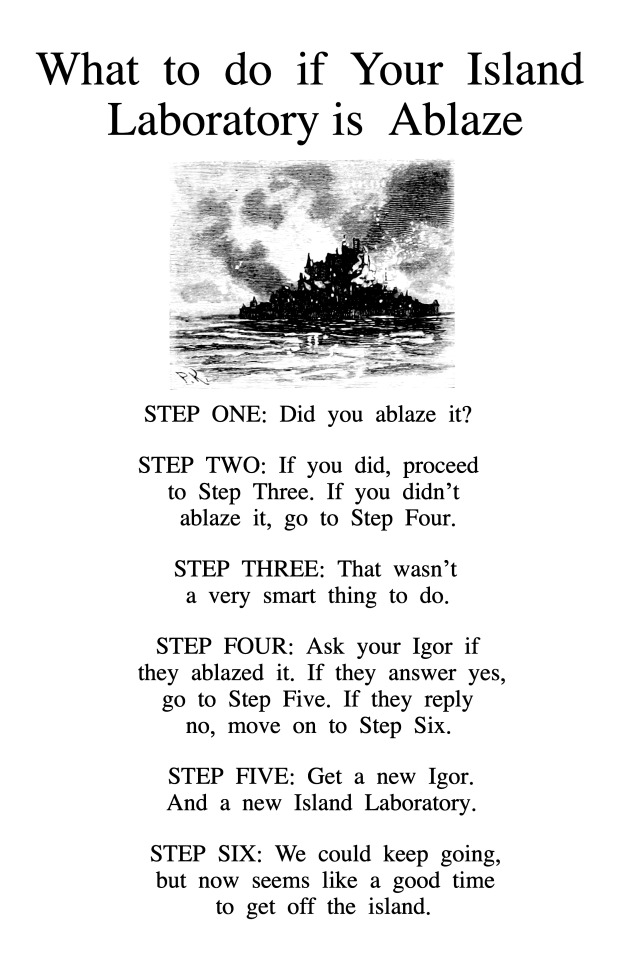
#What to do if Your Island Laboratory is Ablaze#tips#tricks#life hacks#helpful hints#advice#Igor#science#Science™
721 notes
·
View notes
Text
Worldbuilding: Galactic Empires

My only complaint about the Prequels is that they needed MORE politics
If you've watched Dune recently, you must have noticed the whole Emperor and space noble families thing. And yes, it's likely you heard that in WH40k too… and I HOPE you know that's where the God Emperor came from, since WH40k took "inspiration" from everywhere from Dune to Star Wars. Which also has a Galactic Empire. Like so many other science fiction franchises.
In fact, if you're a science fiction fan, it's very likely that you're familiar with space or galactic empires, they seem to be common as dragons in fantasy. Despite the fact that an empire doesn't sound very futuristic, does it?
Where did all these Galactic Empires come from? Are they just a narrative tool or are they an actual possibility? How would states and societies work in space? Let's find out, and maybe I can give you some ideas on how to write fun galactic "empires" from both a narrative and plausibility perspective.
This is going be a long post. Perhaps my longest yet. But I hope you have as much fun reading it as I did writing it. Click down to continue.
First of all, where did these space emperors come from? In another post, I've talked about the influence of the idea of the rise and fall of the Roman Empire in English-language fiction. However, in science fiction, I would say the influence is more direct. The Foundation trilogy of Isaac Asimov, one of the foundational (lol) works of science fiction, was intended by the author, very explicitly, as a retelling of The History of the Decline and Fall of the Roman Empire by Edward Gibbon in a science fiction setting. He probably wasn't the first to think about a space empire, I'm very sure the term is older, but he certainly popularized it as a staple of science fiction. Now, if your contact with science fiction comes from movies, when you hear Galactic Empire you're of course thinking about Star Wars. But yes, Star Wars is also the same retelling, because Lucas was inspired in both Asimov AND Gibbon, even though I think we should appreciate Lucas' ability to bring it to life in the screen. Certainly, Isaac Asimov wasn't the first or the last to take inspiration in history to tell stories about the future.

The most influential science fiction work of all time.
At this point you're probably telling me (or not, I don't know you) about all other sorts of science fiction works that DON'T have galactic empires, or better yet, those that don't just transpose historical societies into the far future and imagine something entirely new (my personal recommendations on this area are Banks and LeGuin). And you'd be right. But the concept of a space empire seems popular and long-lived, much like feudalism in the fantasy genre, everyone has a picture of a sorts when a videogame or a book talks about a "galactic empire" or "galactic republic" or a "federation", an "empire" much like a shorthand name for "a country In Space", regardless of the presence of an actual Emperor or not. And so, it's worth exploring how this trope could, or not, work, so we can see the possible alternatives or more fun ways to approach it.
Besides, that's the title of the post. Galactic Empires.
So, let's approach this from the perspectives of Space, Time (or to keep with the theme, Spacetime) and Technology, and lastly, the most fun part, we'll explore some fun variations on this idea of galactic empires and societies.
Space:
Space is big, and I won't quote the Hitchiker's Guide to the Galaxy here, it would be groanworthy at this point. Let's do a quick exercise instead. Let's image a "modest" space empire, not even galactic, 2000 light-years across. Sounds quite big, it encompasses most of the visible stars we can see from Earth… however, if you project it into a galactic map, it's actually a very small piece of sky, actually 2% of the entire galaxy which is about 100.000 ly across. Now, according to the Atlas of the Universe, there are 600 million stars in a 5000 ly radius from the Sun. Jesus Christ. This is actually hard to estimate accurately as the true number of red dwarfs and brown dwarfs, the dimmest stars, are hard to count, but we already know those have planetary systems as complex as our own Solar System, even planets that could bear life. Let's scale back to our 2000 ly across space empire, again, just a small cozy corner of the Milky Way Galaxy, something that would look like a small, even tiny, nation in any setting of a galactic scale. This gives us 240 million stars (from the estimated 200 billion stars of the galaxy) in this space, which is still completely insane but let's work with that.
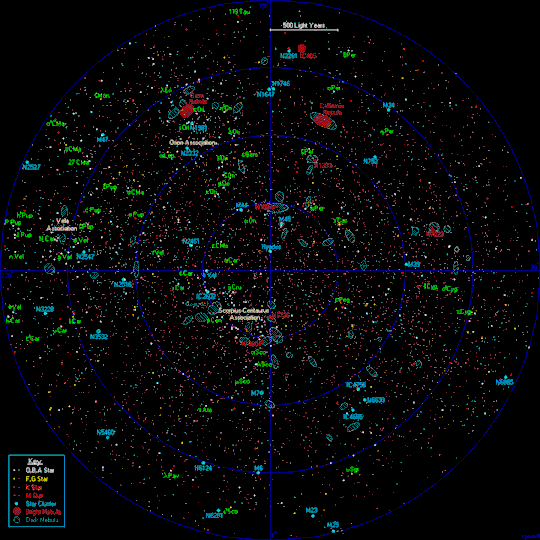
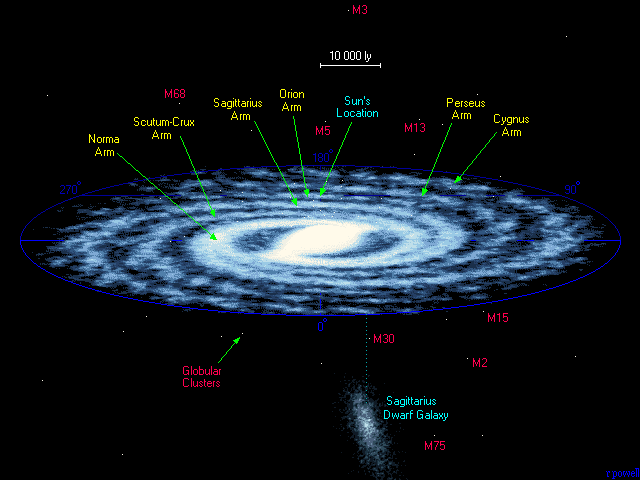
From Atlas of the Universe, so you can compare and contrast, the stars 2000 ly from the sun (ONLY the brightest ones), and the entire Milky Way. Notice how small 2000 light years truly are at that scale.
Even if I just told you that all of those systems might be as complex and rich as the Solar System, let's rather arbitrarily say only 5% of those 240 million are worth of note. Not necessarily having life (no way I'm getting into that yet), just worth visiting or living in for the resources or the views or the cantinas… whatever. That's 12 million star systems. Okay, let's refine this further. Let's say of those 12 million, most of them are the equivalent of gas stations or farmsteads, a couple thousand people at most. The REAL places where the action happens are the systems or worlds where millions of people live, and those are few and far between (this makes both common and narrative sense, as people tend to cluster in population centers where trade, resources, etc. are). Let's say, and let's refine this further so I don't get outrageous numbers, the average population of those systems is 100 million (about the size of Mexico, Vietnam or Japan. Many sci-fi works throw worlds of billions like Earth like nothing). And those systems are… uh, like 2% of THOSE 5% 'systems of note' (a flimsly concept already but play along). That's 2% of 12 million. We got 240.000 systems or worlds the population size of entire countries, with all that implies (economy, culture, politics). Of course, 240.000 multiplied 100 million gives this speculative fictional empire a total population of… (Jesus Christ, not the scientific notations), 2.4e+13, or TWENTY FOUR TRILLION PEOPLE.
Let's wind back and remember I tried my best to make a "small" empire for a galactic-sized setting, 2000 light-years across, that's just from here to Orion's Nebula for Gagarin's sake! A trillion people is just outside the realm of my imagination, or pretty much anyone's. Can you imagine any kind of goverment system that would be enough to provide any kind of meaningful governance to 24 trillion people? In the case of a space empire, can you imagine a single space emperor, a single person, deciding over them? Keep in mind that emperors don't rule on their own (we'll talk about that), they need bureacrats to make their will done, and vassals to govern their territories in their stead. This would apply even in democratic systems, you need representatives and civil servants and more.
Let's scale back a bit before I go insane. Instead of assuming territory, let's go with population. Assume a spherical cow space empire of… 40 billion people, that's reasonable right? You can picture that in your head? Five times the population of current Earth, no biggie, we can work with that, it's all cool. Now, how big would a goverment for such a population would have to be? We actually have reasonable answers. China has about 10 million civil servants for a population of 1.4 billion people, but that's only the administrators, not including all the teachers, healthcare workers, security forces, laborers, etc. employed by the state. India has 6.4 million for about the same population. Okay, so easy math, let's say that this space empire has 6 million bureacrats for 1 billion people, for our empire of 40 billion people, that gives us a total of 240 million… just bureacrats, nothing else. Yes, you could reduce that with technology by say, half. It still means an entire Mexico-sized country of bureacrats. Imagine.

Entire worlds of this.
NOW I WILL STOP THROWING NUMBERS AT YOU, and let's just think about what this means. If we assume a space empire like the ones common in science fiction, or just any kind of… goverment at all, we're talking about, at the lowest estimates, entire countries worth of state employees, if not whole EARTHS of bureacrats. You can guess how things can get really weird fast. Current goverments as we know them just won't work at all it even if technology gets more powerful. Leaving aside, for now, things like god-like AI adminstration (yeah, have you seen what they are like now?)… to exhert ANY kind of control, FTL or not (more on that below) you would need a very, very autonomous empire, to the point it might as well not exist at all. Why take orders from A Guy who is not only far away but also has no hope at all of actually enforcing them in any meaningful sense? Why call yourself part of his "empire" that not only cannot enforce anything upon you, but also cannot benefit you in any way? Big question, of course, the benefit of a galactic or even smaller empire, but we'll discuss that later.
What could work, however, is that instead of a centralized state like we concieve it today, or even a loose confederation, even loose alliances, even pretty much anything… 'empires' (as in 'countries') In Space could be "united" by common ideas and culture instead of any institution. Perhaps not even a written delcration or constitution, but shared ideas: a culture, a religion, an ideology. Lots of different strong mini-states (that might mean billions of people…) that all claim to be part of the same "civilization", but share no goverment at all at all, just the same 'idea', in a looser way that even the most decentralized goverments you can think of. You can say "well all countries are made up" but these would barely qualify as even that. Not even the Holy Roman Empire was this fake.
Perhaps even a single person as a symbolic focus point of unity? Which would be actually a score for the proponents of galactic empires in the most literal sense. But at the same time, such an Emperor would be completely powerless to interact with the entire galaxy. His plans for, I don't fucking know, education reform or tax breaks, would have to be filtered by literal millions of bureaucrats and vassals that at that point might do whatever the hell on his name. Military-wise, his armies would count as nations of their own. However, the overall guidance of a single person (or constitution…) as a symbol might make otherwise disparate worlds to collaborate on the same causes, being part of the same greater whole no matter the distance. So maybe, instead of a Galactic Emperor, a Space Pope?

OH MY GOD-EMPEROR WAS THE IMPERIUM REALISTIC ALL ALONG? Probably not, but also yes, let's keep talking.
By the way, I'm sure you're tired of big numbers now, but I did one possible calculation for the whole galaxy, a true Galactic Empire. Asuming just 0.2% (400 million) of the 200 billion stars are populated, with an average population of one million, the size of the smallest countries that aren't micronations. The total galactic population would be 40 trillion, or 40,000,000,000,000. Five thousand Earth populations.
Time:
Or rather, space-time. We'll talk about both, because what concern us is the speed of information and trade, and that also limits the size of our empires.
I'm sure you know by now faster-than-light travel is impossible. Most of space based science fiction has it, of course, for narrative purposes. We don't want Our Heroes to spend two thousand years to get to the lair of the Evil Space Tyrant, I don't either, and I'll discuss FTL soon. But let's start with no-FTL here, just like in real life, and a smaller "empire", much, much smaller than my previous examples. A mere 250 light years across. Let's not even calculate population now.
This, quite logically, means that the fastest your communications would flow is at light speed. So if your emperor issues orders to a nearby world, say, 5 ly away, you will get an answer 5 years later. For a more reasonable distance of 60 ly, you would know the results 60 years from the descendants of those who recieved the order (now, assume however they keep in constant conversation, just with a 60 year delay), and by then, things there would have changed 60 years from the capital. You get the idea, Einstein sucks, don't need to elaborate more. At first glance, this might be another point for old-style feudal star empires, though. What better way to guarantee your empire is working well over centuries than by having an hereditary class of nobles loyal to you, no matter how much time passes (results may vary). Of course, how would you even enforce that? Rebels might overthrow them and you'll learn about it a century later, and you'll have to send ships to quash the rebellion… or would you?
Is there a point to send ships to conquer other worlds in such a situation? What kind of resources (ah, the lifeblood of empires) could you control with such an empire where transport takes decades and industry is so developed you could, theoretically, make manufactured goods yourself? I'm assuming you can, because you can build spaceships to get there in the first place (not unreasonable), but what would justify creating an interstellar goverment controlling people, trade, resources, over light-decades? Normally, it's at this point where sci-fi authors make up Something (what Atomic Rockets calls "McGuffinite") to justify interstellar trade. In Dune, for example, it's Spice, which is kind of like, to steal a joke, petroleum mixed with cocaine. But otherwise, in a no-FTL setting (so, real life as far as we know) there isn't really the incentive to conquer or even form a goverment of any but the looser kind with other worlds. Trade, maybe, but those are long-term investments, it's difficult to think what kind of good or service would be so in demand would justify it. Especially when you consider that light-speed is your upper limit, and ships might be actually way slower than that. And I'm not even gonna begin to touch relativistic effects.

I was going to make a joke about blowing a quarter of your GDP in Star Destroyers, but have you heard of the South American Dreadnought Race? One of our dumbest moments down here, surely.
Add FTL, and things change, of course. Even very slow ships, that would take months to transverse a dozen light years, would be able to justify trade in luxury goods and passengers, for instance. This is not too far from real-life either, after all, European colonial empires had travel times in the months, and they had to install local administrations such as viceroys because of this, yet rhose places they were considered part of the same empire (most European empires could be rather considered a collection of "countries" and colonies, look at all the divisions of the Spanish Empire for instance). Faster and cheaper ships would of course, mean even more trade (here, I'm using 'trade' as 'communication between worlds', not necessarily implying capitalism, it could be mercantilism or even a command economy) between worlds, even perhaps the classic trope of agrarian and mining worlds feeding the rich core worlds. The Open Veins of Latin America In Space. Fun.
The speed of your ships and communications not only determines trade, but the power projection of your state (we can discuss 'stateless' societies too, there's plenty of fun to be had). If, again, your Galactic Emperor makes a Galactic Proclamation from the Galactic Palace near the Galactic Core (let's roll with that) and he has no FTL communications of any kind, it means that his commanding voice would reach the outer edges of the galaxy 100.000 years after, that is, almost ten times the history of agriculture on Earth. If he, however, has access to ships that can cross the galaxy in say, months, yes, perhaps he can have a series of vassals all over the stars (perhaps, we'll see…), and the faster things are, the closer they resemble our current fast-paced society, but not quite, given the available resources and space in… SPACE and the possible population, as we discussed above. As you can see, the speed of your FTL or lack of it determines everything.
There is another, more *realistic* option. Instead of individual FTL ships, you could have wormhole portals connecting worlds. This is more realistic in the sense that it's theoretically possible (though we have no idea on how to make one), but it also has some interesting implications. First of all, there is an implication that such a wormhole network would be expensive to build and maintain, requiring highly complex technology, material (I'm not sure what the hell exotic matter really is) and production methods, well, more high than what you'd expect from the usual. Second, it would be something preferably fixed, with hubs, planned routes and regular transit (and for writers, it easily allows you to map your universe). Such networks would be vital pieces of infrastructure, built and maintained by central authorities, drawing routes and transport hubs in space. Yes, indeed, almost like… space railroads.

OH MY ASTRAL EXPRESS WAS HONKAI STAR RAIL REALISTIC ALL ALONG? (last joke I promise)
There is also a very strange effect about wormhole networks. Time is relative, as you know, and this is not a metaphor, it literally "flows" differently on how fast you're moving. The "universal" "speed" of "time" "seems" to be the speed at which matter moves in an expanding universe (red-shift and blue shift) as I understand it, but as you approach light-speed, time flows differently in your frame of reference. Wormholes are strange in the sense that they connect space AND time, the observable time in both sides of a wormhole would be the same, and as such, places connected by a wormhole network will "be" at the same "time". This has been talked about by some authors who have considered about wormholes in the context of space civilizations, and it's called (STOP!) Empire Time. So a space empire might not only imply a state ruling over a population and a territory, but also over a time. I have no idea how this works and it frankly makes my head hurt, but here is an analysis of transversable wormholes if you want to indulge or hit your head against a wall.
Technology:
As an extension from the previous section: Of course there is no working FTL method known in real life, as far as we know, light-speed is the upper limit for everything. Instead of constraining you as a writer, this can be one of your biggest assets.
Because if you're doing a space setting, the existence of faster-than-light travel and its speed is the most important decision you can take about it.
Got that? Did I emphasize that enough? You don't need to actually explain HOW your FTL system works, you can do some research and invent something, but you need to be clear, in your head, what it can DO: How far and how fast it can take you. A FTL system that takes months to go from star to star will be very different to one that takes hours to span the Galaxy like the hyperdrive of the Millenium Falcon. A FTL system that is cheap and can be installed in any tiny ship like in the Elite videogame would be different from the ones in Dune where interstellar travel requires enormous motherships and lots of drugs, or a wormhole network that needs massive infrastructure maintainment and probably a railway starway worker's union, or the case of no FTL at all. This is, again, the most important decision you could make for your setting, bar none. Got that? Let's continue.

FTL is perhaps the only place in science fiction where I don't care about how it works, only about how fast it goes
Now, technology. Space empires, are of course, not possible without space travel being cheap enough (not talking about FTL, just regular space travel): shipping stuff to space should be about the same as shipping stuff by airliner or, well, ships. This is not unreasonable. Efforts are being made right now to lower the cost to access space, and while space agencies like NASA might look expensive, they are not NEARLY as expensive as the money wasted in say, stealth jet fighters or fucking advertising (people who say 'why spend so much money in space when we could fix our problems on Earth' seem to forget about that all the time. But I digress.). A technologically advanced, wealthy (as in production, not literal dollars) society could easily afford as much space exploration as they wish with no real effect at all in their quality of life, indeed, it would improve it. Space isn't as expensive as it seems. At its very, very core, a spaceship is just steel and propellant.
And steel and propellant are very, very easy (once you got the technical research to do it) to get in space. Asteroids are MADE of iron and metals, a single asteroid is richer than all of Earth's mines combined. Hydrogen is literally the most abundant element in the universe, and water is on plentiful supply (no need to steal planets for water) on comets and icy asteroids and moons. Carbon is apparently widely available in carbonaceous asteroids, and in our own Solar System, Titan, the moon of Saturn, is basically covered in hydrocarbons (yes, OIL IN SPACE). All those resources could be very much in demand for manufacturing on a planet like for example, a future Earth that has taken its industry up to space. What's more, it's only bringing stuff up from Earth/an Earth-like or more massive planet (fun sci-fi term for you: "down the gravity well") that's really expensive. Once you get there, you can get anywhere with enough acceleration and propellant. Once there is space infrastructure and industry (and I get a feeling that it might get up fast, given that space technology would need to be very autonomous and reliable), it can sustain itself without a mother planet. In fact, if there's something I imagine would be considered a luxury in spacer life, it would be truly organic things; plants, wood, meat, wool, and so much more.

i am average astronaut man i work 15 hours in the asteroid mines to buy one burger
Which brings us to the big question; what kind of life would be out there? After all, I gave you numbers of millions and millions of worlds, it's hard to imagine at least a few of those don't have alien life. This is the biggest outstanding question in astrobiology currently and so I won't pretend to even try to answer it (my personal opinion, if you must, is that complex Earth life is extremely rare, but by sheer number of planets, it might exist by hundreds of thousands in our galaxy alone). Instead, let's try to see how science fiction looks at it.
Heinlein, another of the foundational writers of science fiction as a genre, saw alien worlds as just another frontier to be settled. Rich alien fruit, fertile arable lands, and huntable or tameable creatures just waiting to be exploited, and alien species to trade exotic goods with (or conquer). While Heinlein was not the only and probably not the first to write this subgenre, he certainly got it popular, and lots of works on his same vein follow this "frontier spirit" kind of writing, where space is seen as the last frontier to be tamed by hardy colonists in a very yeehaw cowboy western setting, and you can actually see this replicated in many modern science fiction like Firefly and the more cowboy-ish parts of Star Wars. And yes, this is balantly an expression of the 'manifest destiny' Usamerican imperialist worldview.

lots of Politics all over this Science Fiction Adventure
And yes, this idea of 'habitable' planets ready to be colonized like in a 4X videogame is also not very realistic either. We haven't found any alien ecosystems yet, but as a biologist I can tell you they would be very different from us in ways you probably won't expect. We can discuss how convergent evolution could be, a world with oceans would probably have equivalents of 'fish', 'algae' and 'worms' (I can GUARANTEE there will be A LOT of worms), we could even find very, very similar life to our own down to the body plan. However, we most probably could not eat them at all (which might sound silly at first glance but is needed to have you know. agriculture.), or perhaps even live in the same planet as them. We live in a society planet where most of the plants and animals which evolved with us can't be eaten, and many of them are toxic. It's possible, entirely likely, that the alien equivalents of carbohydrates (ever heard of L- and D-Glucose?), proteins and other substances would be indigestible to us, allergenics, or outright toxic, probably in ways we can't even think off. It's likely we won't catch alien diseases, but that's because our cells (if they even have cells) are completely incompatible with their diseases, just look at how different animal, plant and fungi cells are, now imagine whatever the fuck might evolve in a completely different biochemistry from us. There would be no farmsteads and cowboys like Heinlein wrote, living in Mars would probably be more pleasant that living in a world where everything might be toxic, not because life evolved to be toxic, just because it didn't evolve with you. If anything, these' habitable' worlds would be treated like giant nature preserves instead, you can look but don't touch.
(In one of my own settings, I sidestep this by proposing panspermia, that is, the idea that life spreads across the universe by means such as comets (or aliens) and thus shares similaritites and can eat the same stuff. A bit of a cop-out, but it does allow one to get with similar kinds of life.)

NOOO ANAKIN DON'T EAT THAT PEAR IT EVOLVED HIGHLY TOXIC ALKALOIDS IN A DIFFERENT EVOLUTIONARY CONTEXT NOOOO
But humans, if the biophilia hypothesis is right, will need nature in their lives. This is where orbital habitats come in. You know, like the ones in Gundam? Orbitals such as O'Neill Cylinders, Standford Torii (yeah, that's the plural for Torus) as well as bigger and more complex thingmajings I will write their own post about someday, have been proposed since the 1970s with technology available then, and there is no reason why a civilization with an advanced space infrastructure wouldn't try building them and even be better at it. What's very nifty about orbitals is that you can really make them your own personal custom miniworlds. Designs like the O'Neill cylinder are big, able to house hundreds of thousands, even millions of people if build to the top, but why do that? Mess with the lightining, the rotation, or the interior to make them a winter wonderland or a tropical paradise. I expect that they would be built to feed space communities at first with food that isn't imported from Earth or grown in hydroponics, and later as places to live and customize however you wish; perhaps a community would pool resources together and say, hey, we want to make an habitat that looks like a Colombian cloud forest, or the Okinawan Islands. Once they get cheap enough, and given how abundant resources are in space they might be not even as expensive as most engineering projects here on Earth, I expect actually many, many people would want to live in them, and it could be probably be very affordable, and just natural for the people who are born and raised and live and die in them. Another thing about habitats is that they are mobile. Like I said, as long as you got enough propellant and propulsion, you can move anything anywhere in space. Even whole habitats could move and cluster together depending on the local politics. Perhaps, much like city-states were the basic building block for countries in antiquity, in the future, the basic organization bloc would be the Orbital. You could have alliances of orbitals forming complex political intrigue inside a single solar system (yes, like in Gundam).

OH MY PLASTIC MODELS WAS GUNDAM REALISTIC ALL ALONG? (I lied)
This all might make space empires pretty much an unnecessary anachronism. Habitats can grow their own food and resources are plentiful once you have the right technology. They can also be mobile, so they could act like migrating cities at will, choosing to stay with like-minded "constellations" or strike out on their own without the dictates of a central state. It almost looks like an ideal anarchist society.
Or does it?
There is something very important to keep in mind about life in space. The technology, that is, habitats needed for life in space will require lots of maintainance and resource management, which implies there must be strong coordinating bodies with very, very strict rules so that shit doesn't blow up and you lose all your air into space, or the resources of an habitat are mismanaged and you end up with a food or water or even oxygen crisis. There is a reason why space exploration is done by state agencies or corporations with huge state backing. Another of Heinleins's favorite tropes, Libertarians in Space, would be impossible in such a situation. Actually, in ANY space situation, and this is why this section is in technology. Living in space requires you to be able to maintain complex technology and manage resources. None of this can be done ad-hoc or be left to individualism, you have to have Rules and follow them to the letter. And also, the effect of living in your 'own little world' would probably mean people have a strong indentity sense towards their home habitat. This will mean a more communitarian attitude. But before you think I'm waxing poetic about utopian habitat cultures, keep in mind that this also can mean an authoritarian mindset. After all, cults and authoritarian regimes do have "strong communities" too. An habitat could be everything from a well-managed place with responsible citizens who look for the welfare of all, to a closed society where everybody does as they're told as long as the tech works. On the other hand, I doubt habitats in a single star system would stay isolated. They'll probably trade and communicate with other habitats, forming constellations and power groups, that would prevent this 'closed system'. However, I doubt they would be too amenable to interstellar authority. Who the hell do those people from another freaking star think they are to tell us what to do in our habitat?

To be serious for a moment, habitats can be really cool places in science fiction. Especially if you imagine they could host all sorts of enviroments, from the tropical to the polar.
As an addenum… what if you really want to live in a planet? In places such as Mars or the Moon, things would be… pretty similar to orbitals actually. Habitats separated by vast expanses of barren nothingness, only now a planet instead of space (better for maps, at least). But that isn't what you're thinking, right? What if you wanted to feel the open wind and sky instead of a canned world? Well, this is where terraforming comes in. Transforming whole planets is something theoretically possible, but that would require massive investments of resources, more massive than anything we can imagine, and time, centuries at the very, very least. So stupid ideas like "terraform Mars to escape Earth", which as far as I know is only held by dumbasses like Musk, just don't make sense. It doesn't mean that terraforming itself is a worthless idea, it is a very appealing one. No matter how cool you can make your habitat, it won't ever be Earth. It won't ever be a self-sustaining biosphere with its own ecosystem that could last millions of years. For that reason, terraforming is attractive, it's something way more than an artificial "can" orbital, it's a new living world. There is a certain mystique into bringing lifeless worlds to life, but I expect that instead of the dumb Musk "ESCAPE EARTH" idea, the motivation for terraforming would be to recreate Earth, perhaps for conservation reasons (you could have whole planets as natural reserves), perhaps for tourist reasons, perhaps for spiritual reasons or even artistic reasons. On the other hand, the methods you can use to terraform a lifeless planet can also be used to 'terraform' living planets, as we've long seen in our own world… this could be done with hostile purposes. I would expect us to be better than that, but we simply don't know.
To close this section and give this post an conclusion, I think that, since there are no real borders in space, then empires, countries, polities, whatever you wish to call them, will be formed by stacking building blocs in loose alliances or confederations. The most basic would be habitats, then constellations of habitats, then inhabited planets (though I doubt any but the most populated ones would qualify), and then star systems, but little above that, and I expect up to a certain, difficult to calculate limit of population and area (though way, way below even a fraction of a speculated galaxy), things would be just impossible to manage. The effort in bureacracy, infrastructure and state control needed to project power out of a star system and the sheer scale of space probably won't ever justify empires, much less galactic empires, but you could have very interesting variations on the theme.
Fun Stuff!
So, let's play a little with what I've told you. I'm going to write a few short scenarios that might be fun takes on the "Galactic Empire" or "Space Empires" you might be familiar with already:
The Poleis Model

When the Greeks established their colonies around the Mediterranean, they didn't do it with the expectation they would be part of the same state or empire. They founded new poleis, new city-states, based on the constitution of the mother city (hence metropolis) but fully independent. The Phoenicians were much the same, with some of the daughter cities (Carthage means literally "new city") eventually becoming new cultures far from their home cities. Similarily, why should interstellar exploration mean the spread of a united state with a capital and all? Imagine that when interstellar ships depart, they do with the idea that they are going to create a completely new home, a new poleis, not an extension of the nations or organizations that sponsored them but rather more of a 'child' culture light years away from their motherland. As they develop in mostly isolation from each other, they will become new cultures on their own, while retaining ties to the ones most similar to them. This is, in my opinion, the most realistic scenario without FTL. With FTL, however, things get more interesting, as of course, Greek and Phoenician and other poleis didn't remain isolated light-years from each other, they had permanent contact. With FTL they could organize in leagues, perhaps even alliances for the ocassional military campaigns, trade and exchange of ideas, tourism and industry, and of course the Olympics.
The Wormholes Always Run In Time Model

As I've said, wormholes are pretty much like space railroads. Railroads, like other big infrastructure projects, need a centralized authority to be built and maintained. And once you are the central authority that does so, you're already in charge of the biggest arteries of trade and communication. Which makes you basically an empire, officially or not. In fact, this is the closest I imagine a space society would resemble the states we're familiar with here on Earth. If you have control over transport and the hubs of trade and politics, and that transport and communication network allows you to implent your policies, your rule might go very far indeed, and indeed, your main hub might be a great capital, the main station of known space. Now, perhaps you might be imagining a literal space empire with nobles and all that. Why not instead something else? The Socialist Interstellar, connecting the many worlds of the galaxy through a five hundred year plan of railroad wormhole construction in the path to communism... However, this would mean that people outside of the wormhole network might develop in different ways, perhaps the equivalent of nomads to the great settled empires of antiquity. And given what I've briefly touched on Empire Time (*breakdances*), the expression "the portals always run in time" might imply even more than just an aphorism.
The Civilization Cluster Model
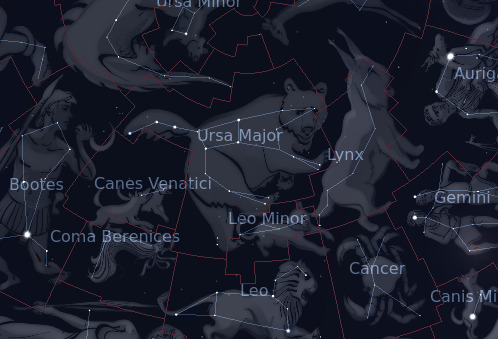
I'll admit this is taken from Poul Anderson, as quoted in Atomic Rockets, to which I owe an inmense debt for this post and so much more. The idea is this; space is big, as is well established. Even with FTL to shorten the distances, even if you could cross the galaxy in a few weeks, the sheer number of stars is still insanely massive. Why should any civilization 'colonize' those stars dot by dot, what value is there in invading or colonizing planets with incompatible biochemistries? And how could even begin to think how to administer a thousand different worlds, each one as complex as Earth itself, let alone an entire galaxy? In this case, civilizations, instead of spreading across the galaxy, would mostly remain in their own 'civilization clusters'; even with FTL, there are so many issues closer to home that the idea of projecting power outside is ridiculous. There would be trade, exchange of ideas, and so much more between these clusters, but never constant enough and never with the authority necessary to create a "Galactic Empire"… the worlds are too many, too diverse, too populated and too far away for that. An interstellar traveller could roam the Galaxy for years exploring these clusters spread away from each other, with their own unique idiosyncracies and civilizations inside, and then a vast expanse of mostly nothing outside them. Basically, space is too big. I like to see them as constellations among the dark sky, hence the artwork.
The No Man's Sky Model

To live in space, you need complex technology, but also resilient and durable technology ready for any kind of situation, easy to repair and replace. So eventually, I believe designs would be standarized so much that every astronaut will carry or own a collection of standarized tools (somehow this reminds me of prehistoric tool cultures). Now, even with FTL, there's perhaps little material incentive for people to leave their comfortable homeworld or habitat to live in cold space. But some will, perhaps because of the sheer thrill of it, perhaps very small bands of families or friends. With a standarized tool kit for any ocassion, these small bands would spread across space, much like ancient humans spread across the world. But instead of creating space empires, without a fixed industrial base, they would be nomads. Which doesn't mean they would roam aimlessly, they would be seeking new biospheres, new resources and new cultures, and gathering in temporary or permanent market places, festivals and pilgrimages. Perhaps they could even be the majority of humans in space, while most others stay cozy on Earth.
...
This was a very long post and it took a lot work to make, so I hope you had as much fun reading it as it was for me to write it. If you did, and if you would like to see more, I would be very, very grateful if you donated to my Ko-Fi below. Anything helps a lot especially since my country is not doing great at this time governed by a libertarian idiot (not even the fun space kind), and even a little tip encourages me to post more, I'm always working on your suggestions! You can also contact me by DM or asks if you need any help with your worldbuilding or just want to rant with me a bit! See you next time, and thanks for reading.
248 notes
·
View notes
Text
I need this to go viral for the sake of everyone with ADHD / Autism / Neurodivergence
Do YOU chase dopamine by learning new things? Do you learn new skills and don't know why you want to do that but do it anyway?
well, I might have THE ANSWER for YOU!
There is a certain effect called the Eureka Moment. That moment when you FINALLY understand some topic that didn't seem impossible to learn, but out of reach for you to master at the moment.
This is a so-called Eureka Moment. The intensity of that moment rises, when you know less about a topic prior to the moment.
When learning a completely new skill, learning a new language, a new instrument, learning something about philosophy or science... all these things can trigger it in intense ways.
The journey of your life is like a puzzle. You build a personality, a life, an archive of knowledge and skills of sorts. And when learning a new ability or skill, you find singular pieces... they may fit into a 'sort of' shape... but the bigger picture is out of reach. Then one crucial moment, you learn a random thing that wasn't particularly grand or anything... and THAT puzzle piece brings everything together. The pieces literally fall into place.
And it's very likely that there's a bio-chemical reaction in your brain... which overloads your brain with dopamine... but that is exactly it.
Your brain is still chasing dopamine by learning new things... but what it really wants... is that Eureka explosion in your brain. It wants to be loaded to the brim with free flowing dopamine. Suddenly you feel unstoppable and ... you feel like all the work you did was worth it. At least I do now.
#adhd brain#adhd#adhd stuff#living with adhd#actually adhd#adhd things#autism#audhd things#actually audhd#audhd#tism moment#tism things#life advice#philosophy#science#neurodivergent#neurospicy#neurodiversity#neurodiverse stuff#please blow this up#make this go viral#please#i'm beggin you#eureka moment#eureka
622 notes
·
View notes
Text

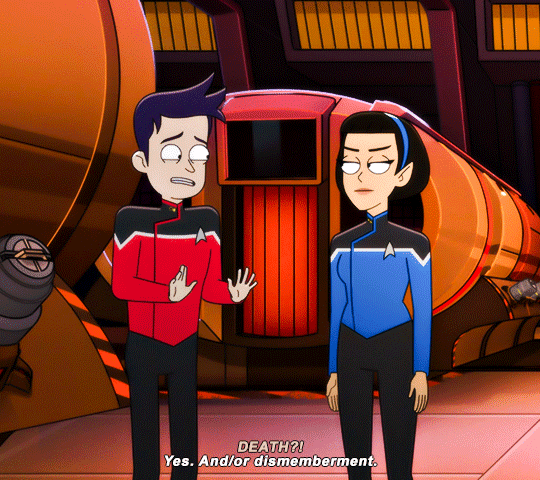


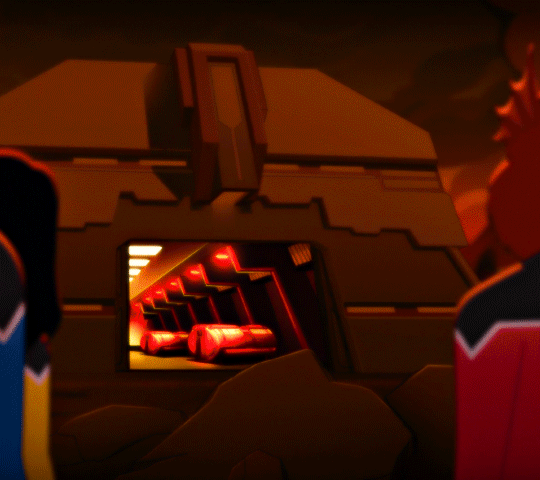

STAR TREK: LOWER DECKS — 4.03 "In the Cradle of Vexilon"
#what's that human expression? famous last words? >:)#lower decks#t'lyn#brad boimler#lower decks spoilers#lwd#lwd spoilers#trekedit#startrekedit#lowerdecksedit#lwdedit#tvedit#scifiedit#animationedit#star trek lower decks#flashing gif tw#why are t'lyn's hands so much more tan than her face....that is not my fault. science pls explain#anyway. i love her haha and she gave some genuinely helpful advice this episode <3
585 notes
·
View notes
Note
I'm writing a sci-fi story about a space freight hauler with a heavy focus on the economy.
Any tips for writing a complex fictional economy and all of it's intricacies and inner-workings?
Constructing a Fictional Economy
The economy is all about: How is the limited financial/natural/human resources distributed between various parties?
So, the most important question you should be able to answer are:
Who are the "have"s and "have-not"s?
What's "expensive" and what's "commonplace"?
What are the rules(laws, taxes, trade) of this game?
Building Blocks of the Economic System
Type of economic system. Even if your fictional economy is made up, it will need to be based on the existing systems: capitalism, socialism, mixed economies, feudalism, barter, etc.
Currency and monetary systems: the currency can be in various forms like gols, silver, digital, fiat, other commodity, etc. Estalish a central bank (or equivalent) responsible for monetary policy
Exchange rates
Inflation
Domestic and International trade: Trade policies and treaties. Transportation, communication infrastructure
Labour and employment: labor force trends, employment opportunities, workers rights. Consider the role of education, training and skill development in the labour market
The government's role: Fiscal policy(tax rate?), market regulation, social welfare, pension plans, etc.
Impact of Technology: Examine the role of tech in productivity, automation and job displacement. How does the digital economy and e-commerce shape the world?
Economic history: what are some historical events (like The Great Depresion and the 2008 Housing Crisis) that left lasting impacts on the psychologial workings of your economy?
For a comprehensive economic system, you'll need to consider ideally all of the above. However, depending on the characteristics of your country, you will need to concentrate on some more than others. i.e. a country heavily dependent on exports will care a lot more about the exchange rate and how to keep it stable.
For Fantasy Economies:
Social status: The haves and have-nots in fantasy world will be much more clear-cut, often with little room for movement up and down the socioeconoic ladder.
Scaricity. What is a resource that is hard to come by?
Geographical Characteristics: The setting will play a huge role in deciding what your country has and doesn't. Mountains and seas will determine time and cost of trade. Climatic conditions will determine shelf life of food items.
Impact of Magic: Magic can determine the cost of obtaining certain commodities. How does teleportation magic impact trade?
For Sci-Fi Economies Related to Space Exploration
Thankfully, space exploitation is slowly becoming a reality, we can now identify the factors we'll need to consider:
Economics of space waste: How large is the space waste problem? Is it recycled or resold? Any regulations about disposing of space wste?
New Energy: Is there any new clean energy? Is energy scarce?
Investors: Who/which country are the giants of space travel?
Ownership: Who "owns" space? How do you draw the borders between territories in space?
New class of workers: How are people working in space treated? Skilled or unskilled?
Relationship between space and Earth: Are resources mined in space and brought back to Earth, or is there a plan to live in space permanently?
What are some new professional niches?
What's the military implication of space exploitation? What new weapons, networks and spying techniques?
Also, consider:
Impact of space travel on food security, gender equality, racial equality
Impact of space travel on education.
Impact of space travel on the entertainment industry. Perhaps shooting monters in space isn't just a virtual thing anymore?
What are some indsutries that decline due to space travel?
I suggest reading up the Economic Impact Report from NASA, and futuristic reports from business consultants like McKinsey.
If space exploitation is a relatiely new technology that not everyone has access to, the workings of the economy will be skewed to benefit large investors and tech giants. As more regulations appear and prices go down, it will be further be integrated into the various industries, eventually becoming a new style of living.
#writing practice#writing#writers and poets#creative writing#writers on tumblr#creative writers#helping writers#poets and writers#writeblr#resources for writers#let's write#writing process#writing prompt#writing community#writing inspiration#writing tips#writing advice#on writing#writer#writerscommunity#writer on tumblr#writer stuff#writer things#writer problems#writer community#writblr#science fiction#fiction#novel#worldbuilding
200 notes
·
View notes
Text
People don't realize that worldbuilding creates context for certain actions. Certain aspects of your world might not be there as things that actively play a role in the plot, but they will exist to influence characters actions.
For example, if you have a world where every faction is acting unusually paranoid, often even to a detrimental level, that's going to read a lot differently depending on your world's lore. If that's happening after a hundred year peace then that reads way differently then if that's happening during the recovery after a devastating war.
The thing you have to remember when worldbuilding, especially with lore, is that the world people live in informs their actions. The way things play a role in your world is going to effect how the characters interact with them. Murdering someone in revenge is going to be a lot different in a technologically advanced future then it is a post apocalyptic hellscape (and if that is normalized in an advanced future that informs us a lot about your world.)
You can design magic systems and ftl drives all you want, but if you don't think about how things inform the culture and the way people in this world live their lives, it'll all feel flat.
#worldbuilding#fantasy#writing#writeblr#writers on tumblr#writers#my thougts#urban fantasy#science fantasy#science fiction#scifi#writing advice#fantasy worldbuilding#worldbuilding advice
996 notes
·
View notes
Note
hello!! I'm a highschooler who's high-key OBSESSED with vampire squids and I really, really want to do research on them in the future if possible. Aside from the obvious things that I have to do (major in marine bio, get involved in as many lab/research projects as possible in undergrad, etc), what else can I do to ensure that I get the chance to study these dudes in the future? (I hope this question makes sense)
I pretty much want to dedicate my life to them because I love them so much. Also, you are one of my biggest inspirations for pursuing teuthology!! Thank you so much for everything you do!! The Ologies podcast episode that you featured in did wonders for my passion ❤️❤️❤️
This is amazing! I love this!
Ok so we got good news and medium news. Good news, there are lots of people working with cephalopods, and you can totally work with vampire squid if this is your calling. Medium news is that generally speaking people don't work on JUST vampire squid. In my personal experience, when it comes to working with animals like this, that we don't see very often, many scientists end up working on a bunch of animals INCLUDING that animal. Sometimes people will work on one animal their whole careers, especially those that are good for keeping in the lab. Deep sea critters are just... harder! So for example take Kat Bolstad at ALCES in New Zealand- her lab works on a whole bunch of deep sea cephalopods! A lot of this also depends on the KIND of science you're doing. Are you working on fossils? Molecular Biology? Behavior? Ecology? This also determines how specific the animals you'll work on will be.
Other than the things you mentioned, just being in conversation with other scientists online and reading as much of the literature as you can so you come in with an existing deep knowledge of the animal is great. This is also super useful because you'll learn about WHO is working on these animals that you'd need to meet. A lot of the squid biologists talking to each other happens on twitter. It helps when the scientists who might hire you already know you and social media helps with that!
250 notes
·
View notes
Text
Worldbuilding Countries (Part 1)
I've lived in and visited a few countries in my life, which gave me a lot of inspiration for my fantasy novel. I'm not an expert, but I thought I'd share what I learned!
Climate
The climate will most likely come up at some point. Do you mention the cool breeze, or the orange leaves on the trees? All those nice weather descriptions will depend on the climate!
If you have a couple of different countries, it may be a little weird if they all have the same climate (especially if they are far away from each other), so there's a few things you can consider to make them a bit more specific.
Climate is of course a very complicated topic, so I will simplify it a bit.
Temperature
I like to pick a real country/city and look at its temperature graphs on Wikipedia. One important thing to note is that countries aren't simply colder/warmer than one another. I know a lot of people think that a country like Russia is cold all year round, but it is actually quite warm in summer. Some areas have a larger variation between temperature throughout the year than others (normally, the closer to the equator a country is, the less variation there is. They also tend to be warmer).
Look at Singapore:

The temperatures are basically stable all year round (the letters up top are the months). The numbers are the average minimum and maximum daily temperatures. You can see that on average the variation every day is less than 10°C.
Here is Moscow:
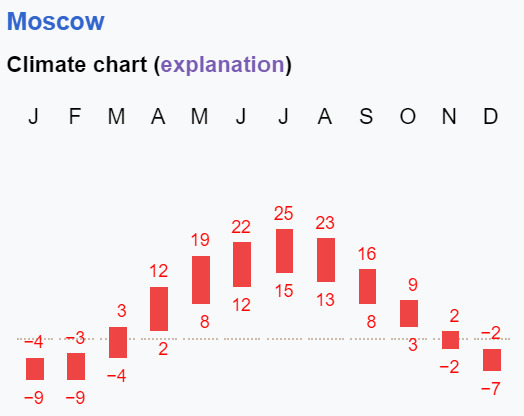
The temperature changes quite a lot throughout the year. Note that the maximum temperatures (summer) will occur at the opposite times of the year in the Southern Hemisphere.
You can see this demonstrated in Copiapo (Chile):

This city is in the Southern hemisphere, so their coldest months are June and July :)
One thing you may have noticed is that the bars here are taller, which means that the variation for the daily min and max are higher too. Why is that? I'm simplifying it a bit, but generally, the dryer a place is, the more variation you will get in daily temperature. Which brings us to the next thing to consider:
Humidity/Precipitation
There are a few things to consider:
Rainfall. This can vary month-by-month, and due to some complicated factors, some countries have more rain in their colder months, some have more rain in their warmer months. Some places don't follow a neat pattern or stay consistent throughout the year. Have a look at climate pages on Wikipedia to get some ideas! Even just this page on Chile has a lot of cool examples. Each city is quite different!
Although of course the "wetness" of a country related to rainfall (e.g. you'd expect greener grass somewhere with more rainfall, brownish dry grass or a desert somewhere with less rainfall), it's not that simple. UK is a wet country, right? And if you've heard of Gold Coast (Australia) it seems pretty dry, right? Well, actually the Gold Coast gets twice as much precipitation (rain) as London!
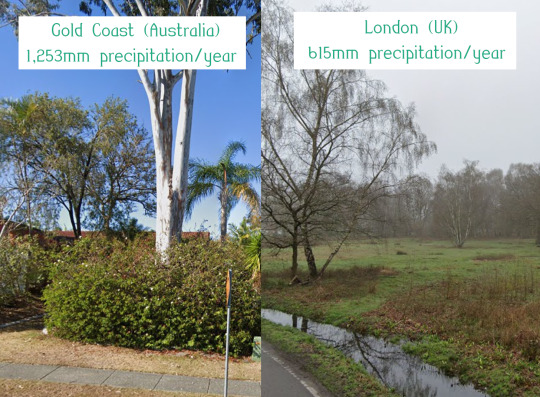
To demonstrate, I took a screenshot (randomly selected street in each city) from Google Streetview.
Why this difference? I suspect it's because the Gold Coast is much hotter. Living in Australia, puddles are normally gone by the next day (often the rain even evaporates as it hits the ground!), but in UK, the puddles would always stay around for a while.
The UK is always mossy, often the clouds hang in the sky for ages. It can look quite grey. When it rains in the Gold Coast in summer, the raindrops evaporate as soon as they hit the pavement, which makes the air feel very humid and smell strongly of rain. You can use these sorts of sensory details in your stories :)
Also, one thing I noticed, is that in hotter weather, rain can be much more heavy than in colder weather. In Australia we often get heavy rain that causes flooding. In UK the rain usually dribbles all day but doesn't get heavy. In a place like the Gold Coast you can get rain that last 10 minutes but soaks you all the way through and floods the street.
The rainfall may also vary year-by-year. Australia goes through periods of floods and droughts that last a couple of years. The mechanism is a bit complicated so I won't go through it now, but it gives you something to google!
Humidity: Deserts have low humidity, which means that you can cool off more easily in the shade and the nights are colder. The breeze feels more refreshing at low humidity as your sweat evaporates.
High humidity (like Singapore) will feel much hotter at the same temperatures and it is normally still quite hot in the shade. High humidity feels really muggy, the air feels thick. The sweat doesn't evaporate as much, so you are left all wet and sticky. The breeze can feel much less refreshing because of this.
When the temperature is below freezing, the humidity gets very low, so your skin may need more moisturiser or your lips may crack.
Those are just some things to consider while describing your weather!
Generally, closer to the sea will be wetter, further inland is dryer. Have a look at some climate maps on Wikipedia, you will learn a lot! Climate is quite complicated since there are so many factors, so there's a lot you can do with it.
UV: This is one thing that people often forget about when they think about weather. In the UK, even on a very hot and sunny day, you are unlikely to get sunburnt (unless you are very pale). In Australia, you can get sunburnt very easily in even Tasmania, which is our coldest state, even when the temperatures are chilly.
You can't actually feel being sunburnt, which I fully understood when I visited Tasmania. I was freezing, but the whole time I was being sunburnt.
Normally, UV index is higher closer to the equator, which is why people who live closer to the equator tend to have darker skin. The melanin acts as protection against the sun. Still, this protection isn't perfect, so in the real world people in Africa used different methods to protect their skin, such as using clay as a "sunscreen".
Australia has the highest rate of skin cancer in the world. This is partially because most people in Australia have pale skin (originally from the UK), but the UV index is high.
This is something to consider in your story, since it can play a bigger role in behaviour than you'd expect if you live in a cold climate. In Australia, they recommend staying indoors between certain hours of the day to avoid sunburn, and if you do go out you should wear clothes that cover your skin, a wide-brimmed hat and sunscreen. Someone with very pale skin can get sunburnt in minutes. Wide-brimmed hats are compulsory at schools in Australia - you are not allowed to play if you forget your hat.
In low-UV areas, there is the opposite issue. People with darker skin can have problems getting vitamin D. Same goes for people who cover their skin with clothing (e.g. for religious reasons). However, this is a bit simpler to fix with some vitamin D supplements.
How do I use this for worldbuilding?
If you have a map of your countries, you may want to keep their location in mind when deciding on the climate :)
I like to draw up some graphs with the temperatures throughout the year for each country and some quick notes on the humidity, rainfall and UV.
You can also add some other elements to your story. Is it a fantasy? Maybe magic affects the weather! Sci-fi? You can play with the distance of the planet from the sun, axial tilt, sun size etc. (I won't go into that since it's a whole another topic and really complicated as well)
You probably don't need to know the exact details of the climate for most stories, but having a general idea will allow you to consistently describe what sorts of clothing your characters wear, the weather etc. Those are the sorts of things that comes up in almost every story (if it's long enough).
If you read this and found this useful, please reblog so I know that it was helpful. If it seems like people enjoyed this post, I will make more (I was going to talk about so much more, but this is already too long).
#writeblr#writeblr community#creative writing#world building#writing tips#writing resources#writing advice#how to write#fantasy#science fiction#climate#writing#novel writing#comic writing#worldbuilding#fantasy worldbuilding#fantasy world#writing community#writer stuff
171 notes
·
View notes
Text
Sci-fi worldbuilding ideas for your city planets :)
If the planet is entirely city, where does the oxygen come from? Are their farms dedicated to producing oxygen? Special factories? Are there plants that produce oxygen very quickly all over the planet? Do you have to pay an oxygen tax?
Does the planet have natural water? Are the oceans untouched, incorporated into the city, or have they been drained and the water used for things in the city? What is it used for? Drinking, dams, hydroelectricity, food production, etc?
How deep does the city go? Has the planet been mined into to create more space? Is geothermal energy used? Are the bottom levels reserved for things such as sewage, electricity production, factories, prisons, etc?
What is transportation like? Are there roads, floating roads, or are trains and trams used instead? Are planes used? Is transportation fast enough to quickly travel across time zones?
How is food produced? Is it imported, or is it grown on planet? A combination? Think about greenhouses, factorised farms, vertical farming projects, etc. If oceans are left relatively untouched, is food produced in it? Are fish kept? Are there ration laws?
Are the poles less occupied than the rest of the city? Are they used for storing frozen goods, super computers? On a planet with no oceans, is ice and snow valuable?
The same goes for the equator of the planet. Is it more or less occupied? Is the heat used for anything? Are there solar panel farms? Air conditioning?
Are there parks and protected areas of nature? Ancient gardens, important forests, sacred land? Are there laws about chopping down trees? Are there farms for trees and plants? Are their plant shops, and are they expensive? In Star Wars, a part of Coruscant's highest mountain is a public monument that you can look at - are parts of mountains, rare ores, fossils, etc, preserved?
Not all sci-fi cities look the same. Coruscant has skyscrapers arranged in a very chaotic manner, stretching incredibly deep and incredibly high, and there is almost no plant life or natural parts of the planet to be seen. Xandar is arranged neatly with very similar style buildings whilst remaining relatively low rising compared to other city planets, and has lots of greenery and a fairly untouched ocean. Wakanda is relatively defined in layout, with a mixture of plants and buildings, houses and skyscrapers, with every building being unique. Draw inspiration from whatever you like.
Write whatever you want, even if it's common or cliche. It doesn't matter if it has been done before, because it hasn't yet been written by you.
Happy worldbuilding!
#writing advice#writing#worldbuilding#world building#sci fi#sci fi worldbuilding#alien worldbuilding#planet worldbuilding#writing ideas#writing prompts#worldbuilding ideas#worldbuilding prompt#worldbuilding prompts#science fiction#planet ideas#fanfic prompt#fanfiction prompts#writing prompt#fanfiction ideas#city planets
275 notes
·
View notes
Text

This is what I keep saying!!!
Just build! 🙋🏾♀️
#codeblr#coding#progblr#programming#studyblr#studying#computer science#tech#coding advice#coding tips#study motivation#motivation to study#motivation
221 notes
·
View notes
Text
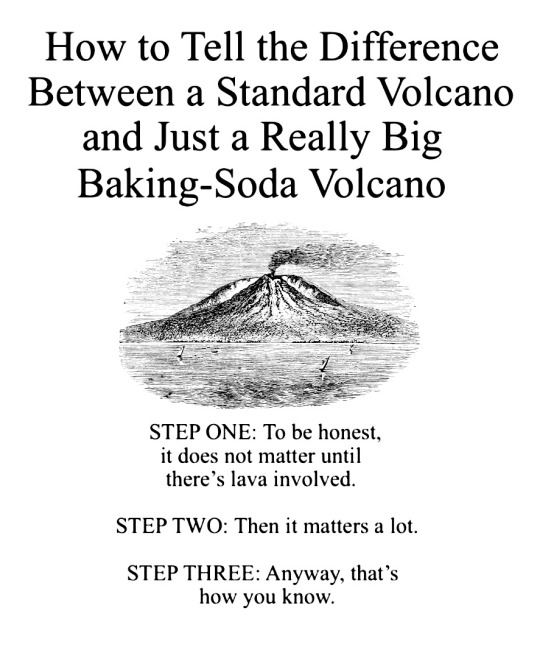
#How to Tell the Difference Between a Standard Volcano and Just a Really Big Baking-Soda Volcano#tips#tricks#life hacks#helpful hints#advice#volcano#science#unreality
764 notes
·
View notes
Text
Giving this part its own post.
Another tip: Let your fucking characters become disabled over the course of the story! If they get their fucking leg chopped off, even if it gets magically fucking reattached, there should be fucking evidence that they lost the fucking leg in the first place! Pain! Reduced sensation! Trouble moving it! Anything to fucking show that the injury fucking happened! Otherwise you just fucking did that to them for no point but to cause cheap, meaningless drama! That's just shit fucking writing!
I don't care if there's magical healing in your universe. I don't care if it's a Super Scifi Future and your character is a robot. (Yes, I am looking directly at The Murderbot Diaries!)
Getting a brand new fucking arm attached after the first one got blown or ripped off should still have physical fucking symptoms! The character noting that it's a different weight from before and constantly being distracted by this! The new arm has faster or slower reactivity to its attempts to move it! Having to learn anew how to do basic shit with a whole new system! Having to try and work with technology that's not actually compatible!!
If your characters receive massive injuries, let those fucking injuries have permanent effects. Stop fucking acting like being disabled is the worst fucking fate imaginable.
And if you don't want your characters' massive traumatic injuries to result in them being permanently disabled........don't fucking have them sustain massive life altering injuries. It's that fucking simple.
By handwaving this shit away and magically fixing everything back to normal, not only are you being ableist as fuck, you're just being an absolutely shitty, lazy writer.
Let your fucking characters become disabled over the course of the story. Your fucking audience will thank you for giving a shit about not only continuity and stakes, but disabled people.
#writing tips#writing advice#might have already given this its own post but I'm too lazy to check.#writing disabled characters#writing disability#writing injuries#writing prompts#scifi#science fiction#fantasy#sci fantasy#there is literally ZERO fucking excuse for not letting your characters become disabled in 2023#if you have your characters constantly getting seriously injured and they're always fine at the end#you are fucking ableist#I do not give a single shit what kind of in universe explanations you have to explain it all away.
613 notes
·
View notes
Text
We talk a lot about reading comprehension and misinformation on this website, but learning how to slow down, assess sources, and fact-check is a skill. A skill a lot of us have not been called on to demonstrate since high school, but a skill that's vitally important in the modern world.
I'm in graduate school for the social sciences (anthropology) - critically assessing sources is part of the skillset we are taught. I've had people ask on my post about historical misinformation, "How can I only reblog things that are true? How can I tell?" And it's a good and important question!
A couple core questions to ask, about history, science, or current events, are:
Who is saying this?
Where are you seeing this information? Is it a legal scholar, a historian with a PhD, a museum curator, an on-the-ground activist, a rando twitter poster, a Mormon conspiracy theorist? For scholarly questions, look for people with PhDs and published articles; for questions of current events, look for what people who are actually there are saying and showing.
Who agrees with them?
Can you find articles from other sources corroborating this, or is it just one guy who is saying this? Conversely, do you see anyone disagreeing and correcting this information? Who?
Does this person have an ideological bias that might cause them to discount conflicting information?
Everyone has biases, of course, but some are obvious. A lot of revisionist American history is put out by Mormon groups to try to prove the literal truth of the Book of Mormon; ditto for history that seeks to prove various things in the Bible. It may be easy for us to laugh at that, but a lot of tumblr revisionist history involves inventing gay historical figures out of flimsy sources because we want it to be true. Is there a reason that the person making this claim might want this to be true? This doesn't necessarily make it false, but it does mean you have to require more robust claims.
What sources do they cite?
Do they cite well-documented research or well-provenienced archaeology? Do they have photographs of what they're claiming happened? Or do their claims rely on nameless, dateless, "I can't show you my sources yet" or "I swear I heard about a guy..." Do they cite any sources or is it "just trust me bro"? Are those sources that they do cite reliable, or are they circular? Do the sources they cite actually say what this person is claiming they say? Are they cutting out half of a quote, or ignoring conflicting evidence presented in the same source?
Is this conspiracy theory thinking?
Is this making claims that an individual or a group is secretly hiding information from the general public? Is it blaming one individual or group for widespread societal problems? Is it claiming that the only reason this isn't common knowledge is because Somebody is suppressing it? Is it claiming that the solution to a complicated political problem is actually simple and everybody knows it but people just don't want to do it for nefarious reasons? That's conspiracy thinking, and it's almost never as clean or easy as the claimant wants you to believe.
Just because someone is saying something confidently doesn't necessarily make it true, but also, just because you don't like something doesn't necessarily make it false. Ask these questions when you see a claim that makes you feel angry - or makes you feel righteous. Look for journalists, scientists, historians, legal scholars, who present their credentials and their sources. Look for multiple independently verified news reports or scientific articles. Determining The One Truth about things is not always easy and sometimes not possible, but asking these questions helps you assess what you're reading critically and evaluate claims.
#history#science#misinformation#current events#saw a post about how people should stop criticizing lack of reading comprehension or falling for misinformation#and should present advice or help instead#which is fair. so here I am#falling for someone saying something wrong confidently is not a moral failing#but it is in all our best interests to try to cut through the bs
165 notes
·
View notes
Note
so I was on the gecko tag this evening and found your blog. and. ackfiyckfykf, my faith in humanity is Restored and I aspire to your immaculate Vibes and absolute happy snazziness. now then,,,, please describe the college tuition fees ( or lack thereof ) in Demark, pleeeeease please I am full of hope because of something I saw on Pinterest but I trust you to tell me the truth :3 ( stares at you )
If you are from within the EU/EEA or a Nordic country, you do not have to pay tuition fees at the University of Copenhagen (I cannot say anything about other unis in Denmark). People from outside Europe have to pay €10,000–17,000 per year. Note that Bachelor's degrees at UCPH at least are all mostly in Danish, so accessibility is a bit limited. Denmark is an expensive city, and Copenhagen especially so, so cost of living can also be a problem.
But all-told, no matter what you do, the costs of uni+life in Denmark are nothing compared with many colleges in the US, or even unis in the UK.
To be honest though, the German fee situation is far better: German universities are free, or close to it. Some states have tuition fees that are moderate, but most have an administrative fee of about €250 per semester. There is also a much lower cost of living basically everywhere. So, seriously consider Germany if you are from outside Europe and want to come here to escape come to Europe to study and potentially settle.
130 notes
·
View notes